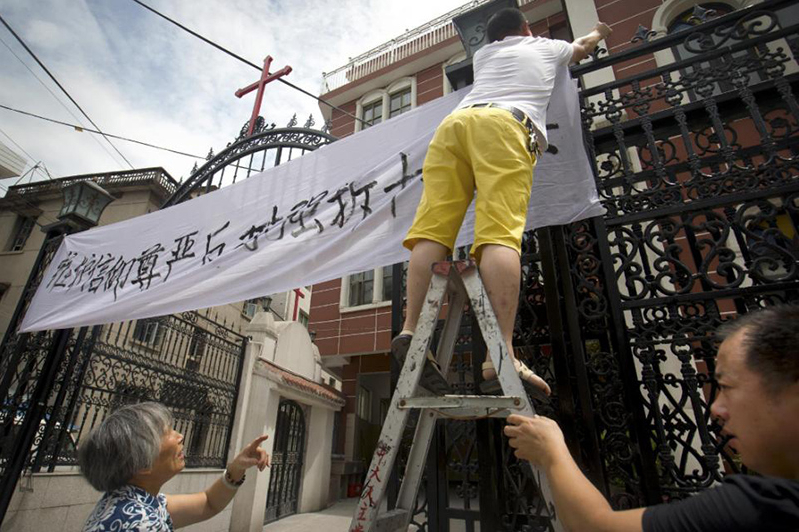
Police in China have detained seven members of a Christian church on charges of embezzlement and other suspected crimes. A lawyer representing one of the members claimed that they resisted a government campaign to take down their church's cross.
According to Sui-Lee Wee of Reuters, the members were detained in Zhejiang province, a part of China where the Christian population is growing. In theory, Communist China officially guarantees freedom of religion, but the government has expressed suspicion of religious groups, including Christians.
"Based on our current understanding of the situation, these charges are false," lawyer Chen Jiangang said. "If they had actively cooperated with the demolition of the church's cross, there would not be any case today."
Chen told Reuters that two of the protesters, Bao Guohua and his wife, Xing Wenxiang, were taken away by police two weeks ago and have not met their lawyers yet. Both are preachers at Holy Love Christian Church in Jinhua city.
"The police publicity department said in a statement titled 'Honest pastors' greedy lives,' and posted on its website, they had found more than 20 pieces of jewelry and wads of cash in the home of Bao and Xing," Wee wrote. "Chen called the statement a smear campaign."
Reuters cited state news agency reports claiming that all seven church members have been detained "on suspicion of amassing large amounts of money from running the church, embezzling donations and instigating others to disrupt the social order."
ChinaAid, a Texas-based Christian advocacy group, told Reuters that churches in China have pledged to carry out civil disobedience campaigns if their crosses are forcibly removed. Zhang Kai, a lawyer representing some Christians, told Reuters that many Christians have camped out overnight to prevent cross removals at their churches.
"Protestant churches have to be registered with the official Three Self-Patriotic Movement Committee," Wee wrote. "Experts say there are up to 60 million Protestants in China, divided between the official and unregistered churches."
According to a report from UCA News, both Christian and Catholic groups are openly protesting the government's cross-removal campaign. One group drew a comparison to the persecution suffered during the Cultural Revolution, which lasted from 1966 to 1976.
"The prelates may need more time to think over and consider the timing of their remarks. In order to not pressure them, we decided to speak out in the name of our graduate class," Father Ambrose said.
UCA News reported that several Protestant churches in Hong Kong held a prayer service outside the central government's office on Monday, contending that cross-removal campaigns was aimed at persecuting Christians. They put up a slogan that read "can't remove the cross in our hearts."
"It is unprecedented to see more and more Catholic groups and dioceses in China speaking out against the cross-removal campaign, as they used to be very low-key," Or Yan-yan, commission project officer, said.
Yan-yan told UCA News that Christians have refused to remain silent on the issue of cross removals in China.
"Today, some protesters face threats and being arrested on political charges, yet the faithful still choose to speak out. You can imagine how grave the situation is for them," she said.
According to Reuters, Chinese authorities have claimed that some cross removals were "relocated" out of safety concerns.






